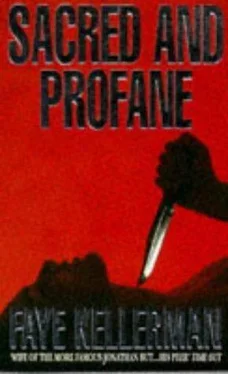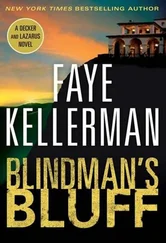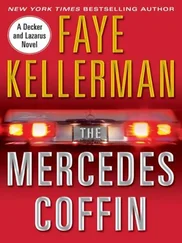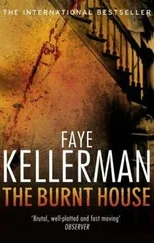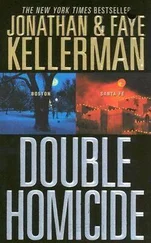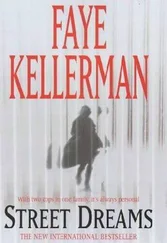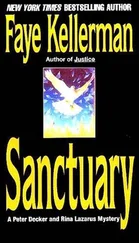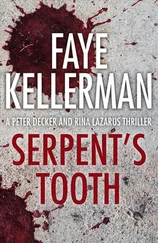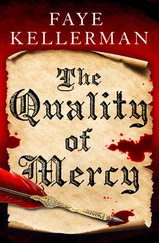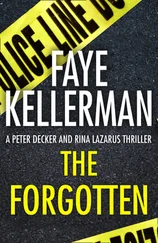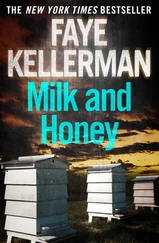Faye Kellerman - Sacred and Profane
Здесь есть возможность читать онлайн «Faye Kellerman - Sacred and Profane» — ознакомительный отрывок электронной книги совершенно бесплатно, а после прочтения отрывка купить полную версию. В некоторых случаях можно слушать аудио, скачать через торрент в формате fb2 и присутствует краткое содержание. Жанр: Триллер, на английском языке. Описание произведения, (предисловие) а так же отзывы посетителей доступны на портале библиотеки ЛибКат.
- Название:Sacred and Profane
- Автор:
- Жанр:
- Год:неизвестен
- ISBN:нет данных
- Рейтинг книги:3 / 5. Голосов: 1
-
Избранное:Добавить в избранное
- Отзывы:
-
Ваша оценка:
- 60
- 1
- 2
- 3
- 4
- 5
Sacred and Profane: краткое содержание, описание и аннотация
Предлагаем к чтению аннотацию, описание, краткое содержание или предисловие (зависит от того, что написал сам автор книги «Sacred and Profane»). Если вы не нашли необходимую информацию о книге — напишите в комментариях, мы постараемся отыскать её.
Sacred and Profane — читать онлайн ознакомительный отрывок
Ниже представлен текст книги, разбитый по страницам. Система сохранения места последней прочитанной страницы, позволяет с удобством читать онлайн бесплатно книгу «Sacred and Profane», без необходимости каждый раз заново искать на чём Вы остановились. Поставьте закладку, и сможете в любой момент перейти на страницу, на которой закончили чтение.
Интервал:
Закладка:
“Thank you, Rabbi. That would be nice.”
The rabbi gave Decker a shot glass and raised his cup in the air.
“L’chaim,” he said.
“L’chaim,” Decker repeated.
The old man peered over the detective’s shoulder and noticed the open chumash.
“Fascinating isn’t it”-Schulman downed the liquid fire in a single gulp-“to read about our ancestors, God’s chosen people? He said to Yaakov, ‘I shall remember your seed, and they shall be as numerous as the stars in the sky.’ And then we learn that Yaakov’s sons sold their brother, Yoseph, into slavery because they were poisoned with jealousy; that Miriam-a prophetess-was turned into a leper because she spoke ill of Moshe’s wife; that Tamar, dressed as a harlot, seduced her father-in-law, Yehudah, in order to secure her rightful seed; that Shimon and Levi-brothers in spirit as well as blood-avenged the rape of their sister by wiping out a nation. Superficially, one would think we descended from a bunch of hoodlums.”
The old man coughed.
“Such is not the case at all. Those men and women were righteous, Peter. On a far higher madraga-level of spirituality-than we are today. You must remember they were worth enough to have been recorded in the chumash for prosperity.”
“But they were still human beings,” Decker said, “with human frailties.”
“This is true.”
Decker closed the book.
“It’s family, Rabbi,” he said. “It brings out the best and worst in us. Whenever a crime is committed, the first place cops look is the family. Almost always, the perpetrator is a relative or friend. Yoseph was sold by his own brothers. No surprise. If that crime happened today, we could have saved Yaakov years of grief.”
“Chas v’chaleylah.” The rabbi frowned. He sat down and put his arm around Decker. “God forbid! Hashem had a bigger purpose in mind, Peter. Yoseph was supposed to go down to Egypt. Had he not gone, Yaakov and his sons would have been wiped out by famine. Hashem knew what he was doing.”
Schulman took off his oversized kipah to smooth his white hair, then placed it back on his head.
“And of course, the Jews would have never been slaves in Egypt. And that would have been terrible, because then we wouldn’t have had Passover!”
He broke into a broad grin at his own joke, then grew serious.
“Events in Jewish history have a way of coming in through the back door,” he said. “Like the selling of Yoseph. Out of that came the Exodus: Moses, the Revelation, the Torah. It is said that even the messiah will not come to us openly. Why? Whenever good comes openly, the yetzer harah-the evil spirit-is there to destroy it.”
“I don’t subscribe to the concept of an evil spirit, Rabbi.”
Schulman refilled Decker’s cup.
“You don’t come into contact with it daily?” the old man asked.
“I come into contact with a lot of bad people,” Decker answered. “And most of them know darn well what they’re doing is wrong. They just don’t care. Ask them why they robbed or raped or killed and you’d be surprised at how creative their excuses are. It’s a rare criminal who’ll accept responsibility for his own actions. An evil spirit seems to me to be another way to pass the buck. The devil made me do it, et cetera.”
“Judaism sees it as just the opposite of what you’re saying,” Schulman explained. “Evil is in all of us. So is good. Man has free will to choose either. There is a very interesting midrash about that. Before Mount Sinai the angels asked Hashem to give them the Torah instead of mankind. After all who is better equipped to do mitzvot-good deeds-than an angel? Hashem refused. Mankind was the only acceptable recipient of the Torah because only mankind could elect to honor Hashem. The angels were programmed only for good. It’s no challenge to be good if good is the sole component of one’s makeup.”
Decker took a sip of schnapps and said nothing.
Schulman asked, “Did you have a bad day, Peter?”
“A little on the rough side.”
“Let me ask you something? What do policemen do when they have a bad day?”
Decker smiled. “They get drunk and gripe to one another.”
“This is what you do?”
“Me personally? No, not really, I’ve gotten drunk on individual occasions, but I’m not a big boozer.”
“I can see that,” Schulman said, picking up Decker’s half-full glass. “So what do you do to cope?”
“A lot of us don’t cope too well. The divorce rate among cops is very high.”
“Isn’t there someone who you can talk to?”
“A shrink?” Decker said. “Yes, we have a resident shrink, but hardly anyone uses him-or her, we’ve got a woman now-unless they’re after disability.”
“Es past nisht, nu?” Schulman said. “It just isn’t done if you’re truly a man.”
“You’ve got it,” Decker said.
“So what do you do to keep your sanity?” the old man asked again.
“I ride my horses,” Decker said. “And now I learn, also.”
“Does learning help?”
“Yes, it does. It takes up a lot of my free time so I don’t think about work as much. It preoccupies me.”
“Do you ever pray?”
“In addition to davening?”
“Yes,” Schulman said. “Do you ever feel the need to say tehillim?”
“I can’t say that I have. I’d like to think that God has a reason for everything, but I don’t really believe that. Some bad people have good luck, some good people are constantly behind the eight ball. What’s the point?”
“A hard question and I have no satisfying answer. We aren’t permitted to know the point. It would be no test of faith if we knew the point. We’d know for certain that Hashem exists. Even Moshe Rabbenu, who was permitted to understand everything else, was not allowed to know Hakadosh Boruch Hu’s system of reward and punishment.”
“Well, maybe it takes a Moses to live with such ambiguity,” said Decker. “What I see are lots of things that are unfair. Our legal system is a farce, Rabbi, confessed murderers getting off scot-free because of some technicality. If only there was divine retribution-a meteorite crashing on their heads or bolts of lightning striking them dead-then maybe I could see a purpose to all of it.”
“I have a midrash for you.” Schulman thought for a while, then said, “A quartet of great rabbis-Rabbis Akiva, Ben Zoma, Ben Azzai, and Elisha ben Abouya-went into an orchard to study the hidden recesses of the Torah. All four were very pious men, all were brilliant-tremendous Torah scholars-an absolute prerequisite for the study of Jewish mysticism.”
“Okay,” Decker said.
“Now the word the Gemara uses for orchard is pardes-a very beautiful garden. Some have taken it to mean gan eden -the Garden of Eden, Paradise.”
“The rabbis actually went to Paradise?”
“There is debate on that. What they did was utter the ineffable name of Hashem-the tetragrammaton. Rashi is of the opinion that says their utterances actually brought them into contact with the Shechinah-the Holy Presence. Other commentators say they really weren’t in heaven but the utterance of the Name made it appear to them that they were. Clear?”
Decker said yes.
“Four of our greatest rabbis in the presence of Hashem,” Schulman said. “So what happened to them?”
His voice had taken on a singsong.
“Ben Azzai died. He leaped toward the Shechinah and his soul departed from his body. Ben Zoma also approached the Shechinah, but instead of dying, his mind was torn apart. He went crazy. What’s the logical question, Peter?”
“Why did one go crazy and the other die?”
“Good. Ben Azzai had seen the Shechinah and couldn’t return to the corporeal. What happened was he had reached such a high level of spiritual understanding that his soul no longer had need of a body. Ben Zoma, on the other hand, never reached that level. His mind became saturated with knowledge that he couldn’t assimilate. When the mind can’t accommodate its input, it breaks down.
Читать дальшеИнтервал:
Закладка:
Похожие книги на «Sacred and Profane»
Представляем Вашему вниманию похожие книги на «Sacred and Profane» списком для выбора. Мы отобрали схожую по названию и смыслу литературу в надежде предоставить читателям больше вариантов отыскать новые, интересные, ещё непрочитанные произведения.
Обсуждение, отзывы о книге «Sacred and Profane» и просто собственные мнения читателей. Оставьте ваши комментарии, напишите, что Вы думаете о произведении, его смысле или главных героях. Укажите что конкретно понравилось, а что нет, и почему Вы так считаете.
